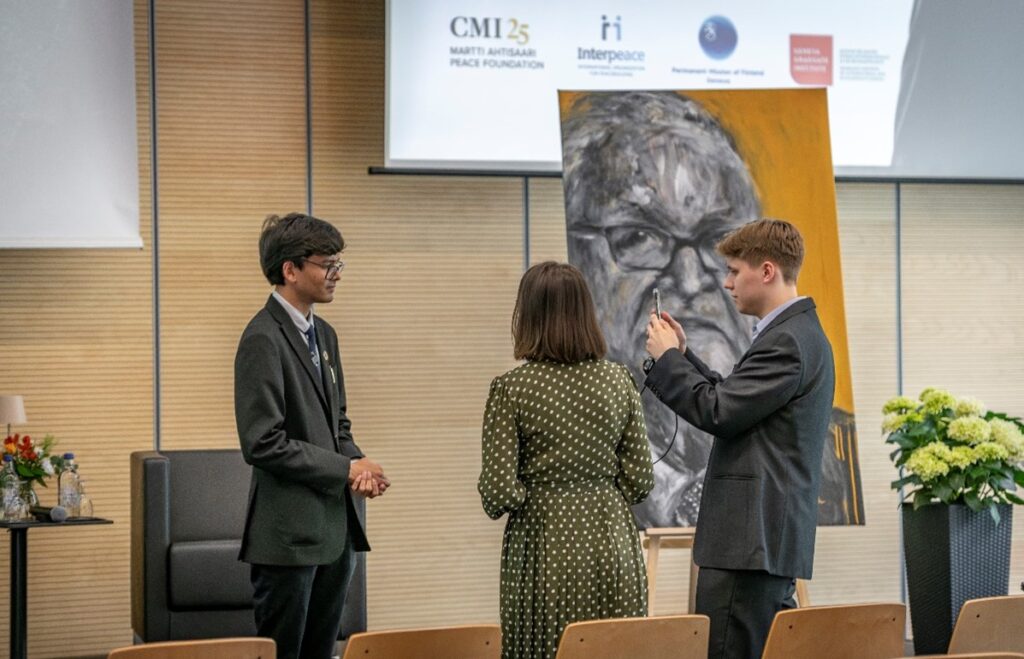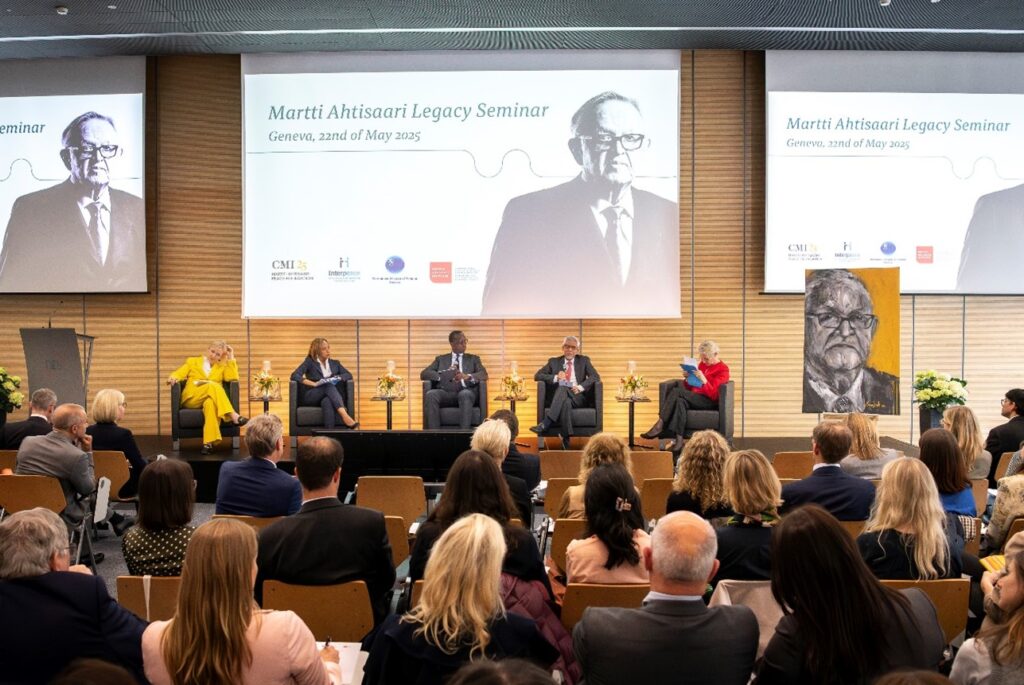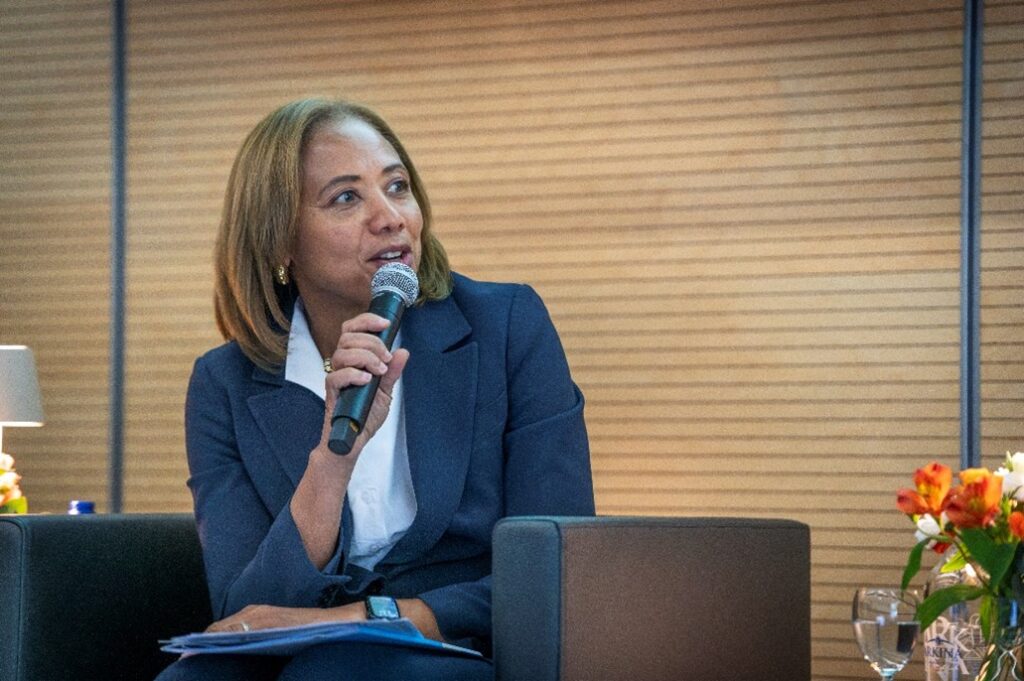On May 21st, I boarded a flight from Chisinau to Geneva, carrying with me the weight of anticipation and deep honour, as I prepared to attend the sixth Martti Ahtisaari Legacy Seminar held on the 22nd of May in Geneva, Switzerland. In my latest capacity as the Project Assistant for the Gagauzia Dialogue project at CMI, I, Elena Sidor, had the privilege to fulfil this time the role of rapporteur.
Arriving in Geneva, the atmosphere was vibrant with purpose, as my mission was not only to document about President Martti Ahtisaari’s legacy – a towering figure in international diplomacy and peacebuilding – but moreover enjoy the event and discussions on values, leadership and dialogue in today’s fragmented world.
Early in the afternoon, I joined my colleagues at CMI to witness the event setup and discuss the possible interview spots. The smooth cooperation among CMI, the Permanent Mission of Finland in Geneva, Interpeace, and the Geneva Graduate Institute was truly motivating, with everyone’s task being clear and aligned with a shared approach.

CMI’s Project Assistant Elena Sidor and Communications Assistant Kaapo Haapanen interviewed Prathit Singh, student at Geneva Graduate Institute. Photo: Olivier Chamard
One of the most humbling moments before the seminar was being able to personally interview some of the key speakers. I spoke with Michelle Gyles-McDonnough, United Nations Assistant Secretary-General; Heidi Schroderus-Fox, Finland’s Ambassador and Permanent Representative in Geneva; Itonde Kakoma, President of Interpeace; and Prathit Singh, student at the Geneva Graduate Institute. Each shared their deeply personal reflections on President Ahtisaari’s contributions to mediation and international peacebuilding and their hopes for a more peaceful world.
Their words echoed a sentiment that seemed to resonate throughout every conversation that day: the need for patience, confidence, and respect in the long road to peace. In a world currently filled with conflict and uncertainty, President Ahtisaari’s principles feel more relevant than ever. As he once said, “You can’t do a damn thing alone.” This statement lingered in my mind long after the seminar—an urgent call for collective action and unity in peace efforts.
The event began with a powerful keynote by Dr. Vjosa Osmani Sadriu, President of Kosovo, who reflected on the instrumental role President Ahtisaari played in Kosovo’s journey to peace and independence. Her words were moving as she reminded us that Ahtisaari didn’t just read about war—he lived through it. His personal experience of loss and conflict shaped a worldview in which peace was not merely the absence of war, but the presence of justice, dignity, and opportunity for all.
President Osmani Sadriu’s reflections echoed Ahtisaari’s values—humility, kindness, courage, inclusion, and unwavering commitment to dialogue. As she said, leadership is not about power, but about standing up for what is right, even when the world disagrees.

Speakers in the high-level panel stressed that those affected by conflict must always be at the heart of peace processes. Photo: Olivier Chamard
The panel that followed brought together prominent voices including Itonde Kakoma (President of Interpeace), Michelle Gyles-McDonnough (UN Assistant Secretary-General and Executive Director of UNITAR), Jagan Chapagain (CEO and Secretary General of the IFRC), Corinne Momal-Vanian (Executive Director of the Kofi Annan Foundation), and Ambassador Heidi Schroderus-Fox (Ambassador and Permanent Representative of Finland in Geneva). Each speaker brought unique perspectives, but a common thread ran through their messages: peace must be built patiently, through inclusion, empathy, and mutual trust and respect.
What stood out was the insistence that those affected by conflict must be at the heart of peace processes. Jagan Chapagain highlighted that negotiation happens with enemies, not friends, underscoring that many of today’s conflicts stem from a sense of exclusion. He urged a strong commitment to inclusivity as a foundation for lasting peace.

Michelle Gyles-McDonnough, UN Assistant Secretary-General and the Executive Director of UNITAR, emphasised the importance of placing people first in efforts towards peace. Photo: Olivier Chamard
Michelle Gyles-McDonnough reminded us that the many international commitments mean little unless they translate into lived experiences of dignity and safety for all. She emphasised the importance of putting people first, a sentiment also echoed by Corinne Momal-Vanian who highlighted the urgent need to reinvest in peace infrastructure and uphold democracy. Not because it is perfect, but because it legitimises peace. One of the most striking thoughts was that while elites play a role in crafting solutions, real peace must be grounded in the lives and voices of those most affected by conflict. Peace cannot be imposed—it must be built from the inside out.
As the panel concluded, Prathit Singh, student at the Geneva Graduate Institute, delivered a thoughtful speech on inclusive multilateralism, human rights, and the memory of peacemakers like Ahtisaari that must guide our way forward.
As I walked through the peaceful streets of Geneva after the event, I felt deeply grateful for the opportunity to participate, listen and learn. This seminar in Geneva proved to me that lasting peace requires all of us in this moment of growing distrust. And I return home, bringing back not just memories, but a renewed sense of duty: to never give up on the idea of peace.

Project Assistant Elena Sidor was the rapporteur at the Legacy Seminar in Geneva.
